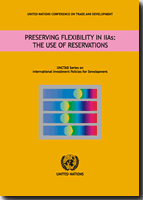
Reservations in International Investment Agreements (IIAs) are a key technique for balancing flexibility of national authorities with international commitments in the field of investment, especially for developing countries. This paper studies the use of such reservations at two levels. First, it assesses the various means that IIA signatories have at their disposal when attempting to preserve flexibility and regulatory autonomy, be it for sectors deemed important from a longer-term developmental perspective or for sectors where particular regulatory or policy sensitivities arise. Second, it explores the revealed preferences for flexibility emerging from the reservation lists of eight IIAs employing a negative list approach to scheduling non-conforming measures.
The study´s opening section devotes particular attention to some of the policy implications flowing from the pursuit of negative list IIAs. The study also highlights some of the potential downsides of negative list IIAs. The study then analyses aggregate reservation lists as proxies of policy preferences and sectoral sensitivities. The study´s findings reveal that many countries, independent of their level of development, feel the need to preserve certain economic activities from international obligations. This trend is more pronounced in the case of developing countries, given their need to face greater social and economic problems while also addressing new regulatory challenges with more limited resources and expertise. The challenge for developing countries remains that of finding the proper balance between maximizing the gains from investment agreements and the additional foreign direct investment (FDI) inflows they can help to induce while also preserving the necessary flexibility to ensure that the benefits of FDI are maximized.



